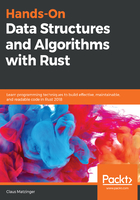
Summary
Rust is a multi-paradigm language with exceptional concepts: the language emphasizes data and behavior separation with structures and traits, uses macros for metaprogramming, and leverages explicit ownership of memory to determine variable lifetimes. Knowing these lifetimes removes the need for runtime garbage collection and, at the same time, greatly facilitates concurrency by allowing mutable borrowing only in certain circumstances.
Consequently, threads and other asynchronous processes can change variables only when they have mutable ownership of them, something that is mostly enforced at compile time, but can also be done at runtime! Therefore, safe Rust is effectively free of data races.
Another strong point of the Rust ecosystem is its diverse and welcoming community. Sponsored by Mozilla, development is guided by RFCs, events are organized and centrally advertised, and learning resources are available online. Another way to be a part of the ecosystem is to contribute packages to crates.io (https://crates.io/), Rust's public package repository. Read the next chapter to find out more about cargo, Rust's universal tool to build and package.